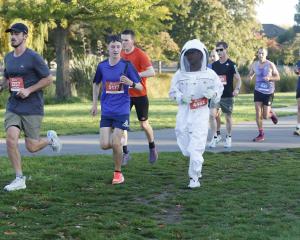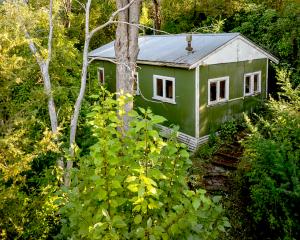
Fears are held for the birds with Crate Day looming this Saturday.
Birds, such as ngūtu pare/wrybill, tūturiwhatu/banded dotterel, and tarāpuka/black-billed gulls, breed in dynamic South Island braided rivers like the Ashley Rakahuri River from early September to the end of January.
Department of Conservation North Canterbury operations manager Leeann Ellis says a large number of vehicles usually gather on the Ashley Rakahuri River for Crate Day.
She is calling for them to go somewhere other than riverbeds if they ‘‘must participate’’ or wait until the nesting season is over in February.
She is asking people to be responsible this year, but if there are issues options like blocking access or introducing bylaws prohibiting driving on the river at certain times of year will be considered.
DOC, Environment Canterbury and Waimakariri District Council work alongside the community and other authorities to manage the impacts of vehicles and other recreationists on the riverbed during nesting season.
Ms Ellis says the birds evolved to nest in the open river gravel and relied on camouflage to keep them safe from the native birds of prey, their only predators until introduced mammals arrived.
‘‘This means they are vulnerable to disturbance and difficult for river users to spot.
We know there are three sites with nesting birds in the upper stretch of the river managed by DOC, and we are asking drivers to please stay out of the riverbed during nesting season.’’
‘‘These native species are also fully protected and it's illegal to harm or kill them. Anyone found doing so could face a significant fine or even jail time.’’
The Ashley Rakahuri Rivercare Group (ARRG) was formed in 1999 to protect riverbed birds and their habitat.
It runs an extensive trapping network, undertakes community education and advocacy for the birds, weeds islands and monitors and bands returning birds and new chicks.
ARRG’s Judith Hughey says four-wheel-drives affect the survival chances of endangered braided river birds, and the group would be disappointed if vehicles gathered on the river for Crate Day.
‘‘Fast, noisy and aggressively driven vehicles can cause birds to abandon nests, kill chicks, smash eggs and leak contaminants in the river, which could render the riverbed, shallows and the river unlivable for larvae, insects and small fish which birds rely on for their daily food.’’

In the lead up to the nesting season the organisations work together to install up to 150 concrete blocks at river access points to deter vehicles from driving on the riverbed.
‘‘We have been pleased with how the vast majority of park visitors respect the nesting birds in areas downstream of the Okuku," says parks and forest manager Chuck Dowdell.
‘‘It is now time to recognise the wider spread of nesting birds along the river and keep clear of all our braided rivers during nesting.’’
Waimakariri council manages the campsite and picnic reserve at Ashley Gorge.
Greenspace manager Grant MacLeod says the council is concerned about drunk drivers unsafely driving past families picnicking and swimming at the gorge on Crate Day.
‘‘This is a popular site and for visitors safety, there is no access for unauthorised vehicles to get on to or off the river at the reserve.’’

Combined 4WD Club chair Mike Sheppard says it's been disappointing to see some four-wheel-drivers behaving poorly in previous years as it reflects badly on responsible drivers.
The club promotes responsible four-wheel-driving and works with land managers around access for their members and maintenance of tracks and facilities, and anti-social behaviour from drivers puts all of this at risk.
Braided rivers are an iconic feature of the South Island landscape. They are dynamic, globally rare rivers characterised by their many braids which change course regularly after weather events.














